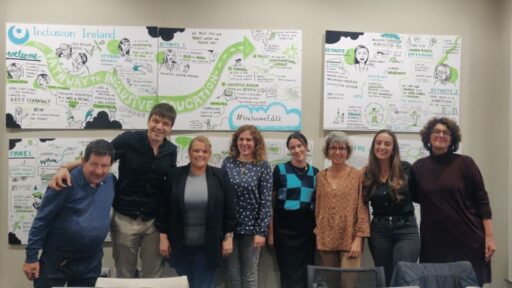
capito goes international: Our project meeting in Ireland
We traveled to Ireland to meet with our project partners for our international project “CCUV”. Learn more about it in this blog post!
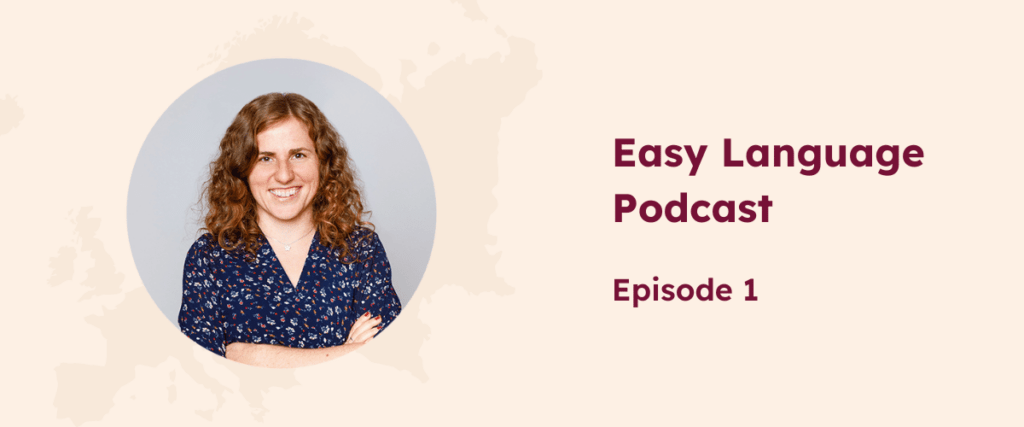
Easy Language Podcast Episode 1:
In our first podcast episode, the host Anja Fuchs interviews Uschi Semlitsch, who works for capito as an expert in easy-to-understand language.
Uschi discusses her work in translating German texts into easy-to-understand and her involvement in the CCUV project, an Erasmus+ initiative that brings together experts in easy-to-understand language.
Besides her experience in working with physical accessibility and as a translator for French and Italian, she is now focusing on Easy Language (or “Leichte Sprache”) in German-speaking countries.
In the podcast episode, you’ll learn …
Uschi: Hello and welcome to our podcast. My name is Uschi Semlitsch. I work for capito as an expert for easy-to-understand language. In this podcast, we talk about the CCUV project. CCUV stands for Capito! Compris! Understood! Verstanden!
In this Erasmus+ project, we get in touch with other experts for easy-to-understand language. And now I will introduce you to my colleague Anja Fuchs. She will host this podcast. Over to you, Anja.
Anja: Hi, my name is Anja. In this episode, I will talk with an expert about the situation of easy-to-understand language in their country. So let’s get started. Thank you for taking the time to talk with me. I know you already gave us a brief introduction about who you are, but can you tell us a bit more about yourself?
Uschi: My name is Uschi and I work with easy-to-read language at capito. I also work with physical accessibility. That means: How accessible is a building, for example. And, I am a trained translator. So, I studied French and Italian, and now I stopped working between different languages, but I’m only working in German more or less. But I’m translating texts to easier German so that as many people as possible can understand them.
Anja: Can you tell us about how this change from translating between languages and now from a more complex language to a more easy-to-understand language German happened?
Uschi: I’ve always liked working with languages a lot, so I wanted to continue to work with languages, but somehow I was missing the deeper satisfaction. I did like my job as a translator, but somehow I wanted to do something more useful for people. So, I decided to look for something that really helped more people.
I didn’t really know much about Easy Language before, and I didn’t really think that it was possible to combine languages and so to say, a social aspect. But then, once I heard about easy language and the whole concept, I knew I wanted to work in this area. That’s when I shifted from translating between two languages to translate into Easy German in this case.
Anja: So, you specifically started looking for a job that focused on easy-to-understand language?
Uschi: Yeah, actually I started looking for something that matched my ideas more, and then I somehow found easy language and yeah, that’s how I got here.
Anja: Can you tell us about where “here” is?
Uschi: We’re here at capito. capito is an expert for Easy Language in German at the moment. We’re currently getting more and more international. capito has been working in accessible information and easy-to-read language for over 20 years now. And capito is a network of several locations in Germany, Austria and Switzerland.
capito wants to design and create information that is as easily accessible as possible for as many people as possible, because information is key and we all need access to information so that we can participate in society and live our own lives the best we can.
Anja: That sounds great. Can you tell us a bit about your personal involvement in this project, as well as the role of capito?
Uschi: In this project, I am on the one hand the project manager, so I organize a lot of things. I have many, many organizational tasks and coordinational tasks on my agenda. But on the other hand, I am also involved in really producing our project results and working with our easy-to-read experts from the other languages. So I have both roles: the more practical one and the organizational one.
And capito is involved in this project with our main company atempo. atempo is the company that coordinates this project, and capito is the team that is really involved in the project because this project really helps us get in touch with other experts for Easy Language and also exchange ideas and best practices, which is very important to develop new training material and guidelines, and also a curriculum that will help make easy-to-read trainings more effective and more fun.
Because our goal in this project is to really help spread the idea of easy-to-read to as many people as possible.
Anja: I see. So if I understand correctly, you accompany this project really from the beginning already.
Uschi: Our company participates from the beginning.
Anja: So it could be the company, not you as a person, but atempo.
Uschi: Yeah, exactly. atempo initiated the project.
Anja: I see. Great. Do you know why atempo initiated the project initially?
Uschi: I think one of the main points was to get in touch with other experts. And to have this opportunity to develop new tools together that we can use in easy-to-read trainings and accessibility trainings.
Because training others is a key action to spread the idea and to disseminate easy-to-read. We really wanted to help improve these trainings and also connect with other organizations that had the same ideas and the same visions as we do. Because we hope to continue the cooperation even after the project is finished.
Anja: I see, so now this project covers, I think, 4 languages in total?
Uschi: Yes exactly.
Anja: Can you tell us which ones?
Uschi: German and English. French and Italian. We have organizations from 5 countries involved. So Ireland, France, Switzerland, Italy, and Austria. It’s really international.
Anja: What I also think is very interesting is the set up between on the one hand, the universities participating and on the other hand companies or how would you say… Organizations that already, translate information into easy-to-understand language. So you have a very theoretical, linguistic approach as well as a practical one.
Uschi: Yes exactly.
Anja: Was it hard finding companies as well as universities that are willing to participate in this?
Uschi: No, I have to say it really wasn’t. Which is a good thing because it shows that the awareness for easy-to-read is already there. People are getting more and more aware of how important this topic is. We just had to contact a few organizations and almost all of them said yes immediately.
And as you said, the organizations that are not universities are already working in this field, so they already have experience in their language with easy-to-read.
So we’re really happy to have them on board. And for the universities. No, it wasn’t hard either, because even at the universities, there is more and more research on the topic. And we were lucky enough to find experts who already did some research in these areas.
Also researching, for example, how people with different kinds of disabilities can easily access texts. One researcher focuses on autism, the others on deaf people, for example. So we really have a variety of different approaches. Also on the linguistic theoretical part, which is really helpful, it adds a lot to the project.
Anja: Sounds really interesting. What’s the specific reason why you chose these 4 languages and these 5 countries.
Uschi: Well, English as the main language used in an international context: we couldn’t do it without English. French and Italian was probably also because these are the languages that I studied and I can work in. Also obviously they are very important languages in the European Union, and beyond.
Because we also have Swiss partners in the project and obviously French and Italian are spoken there as well. We felt the need to start with these languages. But this will definitely not be the last project and not the last languages we will work in and connect with partners in. So that’s just the first step.
Anja: Nice. Did you already have some interesting insights in terms of Easy Language in these different languages?
Uschi: Yeah, the situation is very different. English, of course, is a language that’s spoken all over the world and there is already research and many people working in the field of plain language and Easy Language. So there’s a lot of that in English already.
In French, there are also guidelines for Easy Language.
And in Italian on the other hand, there is Easy Language, obviously, but there’s very little guidelines so far.
And what we’ve seen in all the foreign languages apart from German is that most of the criteria is just not as well researched or scientifically tested and developed. So that’s why it was so important to us to have the universities on board and to make sure they really have, on the one hand, the linguistic approach and on the other hand the input from the from the organizations who have really in-field experience and use easy-to-read everything.
Anja: Can you tell us a bit about the specific situation in German?
Uschi: In German, we have different approaches to Easy Language. On the one hand, there is, for example, “Netzwerk Leichte Sprache”, which is a network. It’s called “Network for Easy Language” that has specific rules for Easy Language that mainly apply to people with disabilities.
And then, we also have the approach of plain language. That doesn’t really have that many rules or criteria to follow. It’s just an easier version of the standard German. And then there’s our capito approach. At capito, we have three language levels of easy-to-understand language.
We followed the European language level. We have the language level A1, the level A2 and the level B1. And we have over 90 criteria for all three levels that are really linguistically researched and also proofed and further developed and improved in the 20 plus years that we have been working in this field.
That’s what makes capito different to other approaches. Because our criteria are much more detailed and they also apply, or you can apply these criteria to different target groups. It’s not only something you can use for people with disabilities, for example. But also for language learners or elderly people or everyone, more or less, for example, people who aren’t experts in a certain field. That’s our approach at capito, and that’s the situation for the German language.
Anja: How available is information in easy-to-understand language in German?
Uschi: It’s getting more and more available, but there’s a lot to do. More and more organizations and companies are being aware of the fact that most people, really more than half of the adults, don’t understand them if they communicate in a very complex language, on a very complex level.
So more and more companies start to simplify their first texts. And what is also very nice to see is that it’s getting more and more of public issues. For example, you have news in Easy Language on the radio or on the Internet of one of the main broadcasting stations in Austria.
In newspapers sometimes there are Easy Language sections. So it’s getting more visible. But there’s still a lot of information that should be easier to access for everyone. I’d say we are in a good way, but still not there. The communication culture should still change and be more inclusive and more accessible.
Anja: In your personal opinion, can you name, let’s say, 3 specific information areas that should be easier to understand, which are like your focus points?
Uschi: That’s a good question because there are so many areas. But I think most importantly, information that has to do with health and security. So information that is important for everyone in order to be healthy and safe.
And then as a third area, maybe everything that has something to do with banking, financing, money and taxes. Everything that’s just related to money because that’s something that concerns all of us and that should be accessible to everyone, I think.
Anja: Absolutely. I think almost everyone can relate to that. One more question. As I understand, capito also very strongly works with their target groups. Is there some involvement of the target groups planned for this project?
Uschi: That’s a very good point because it’s really important. It’s essential to involve the target groups because, you can never say: “This text is easy-to-understand”, without asking the target group. Because they are the ones who can really judge if it’s easy-to-understand or not.
So, as you said, we at capito involve the target group in every information production process. And in this project, we also involve people who need easy-to-read for some reason. We have, for example, self-advocates on board, and we also plan on checking our material with, for example, people with intellectual disabilities or also bilinguals or language learners. So that’s a very important step for us that we always have in mind.
Anja: Great. One question for you personally, again: what is your motivation of participating in this project?
Uschi: I just want to do my part in making our societies and our current communication culture just more inclusive and more accessible. And of course, it’s not something I can do on my own or anyone can do or just one company or organization can do on their own.
I think we can do our parts and make steps in the right direction. That’s what I hope to do with this project. Apart from that, of course, it’s always nice to be in touch with so many nice people and get to know new people. And just exchange ideas on easy-to-read, but also on a more personal level. So that’s a very nice aspect of Erasmus+ projects, of course, because you get to work very internationally.
Anja: Now, this project has been running for some months now. Is there already something you learned that you didn’t know before? Maybe something that surprised you?
Uschi: Something, which is really a very personal learning, maybe, is that you don’t have to plan everything in detail right away. But you can also trust the process and also the people working in it to develop something together. So of course, you need to be prepared and have a good planning and everything.
But I think that also needs to be space for whatever is developed together. And that’s probably one of the learnings I personally had so far. Well, that didn’t surprise me, but I guess the first month of the project also showed that we really need to improve how we communicate, not only in the German-speaking area, but also all over Europe. It was also some kind of justification to do this project.
Anja: Great. Thank you so much. Is there something else you would like to add?
Uschi: I think that was great. Thank you. We will, of course, publish everything we do along the process and also the project results. There will be events, where we will talk about the project results and be happy if anyone joins. And we are always happy if someone wants to get in touch with us, of course.
Anja: Great. Thank you so much. We’re looking forward to that.
Sounds exciting? Then sign up for our newsletter and follow us on Facebook, LinkedIn and Twitter! That way you’ll always be up to date. Feel free to leave us a comment if you have any questions or comments about the project.
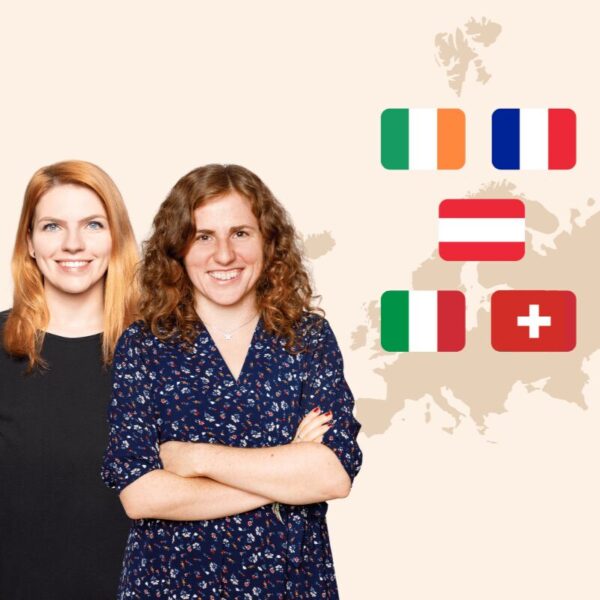
Are there many texts in Easy Language in English? How accessible are Italian authorities? And how do you write in a gender-sensitive way in French?
We asked these questions to experts from all over Europe.
Together we talk about easy-to-understand language in the respective national languages.
Listen now on Anchor, Spotify or Apple Podcasts:

The European Commission support for the production of this publication does not constitute an endorsement of the contents which reflects the views only of the authors, and the Commission cannot be held responsible for any use which may be made of the information contained therein.

We traveled to Ireland to meet with our project partners for our international project “CCUV”. Learn more about it in this blog post!
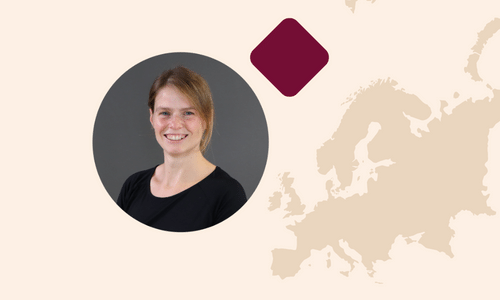
In this episode, we talk with lecturer and translator Marlene Dax about Easy Language in science communication.
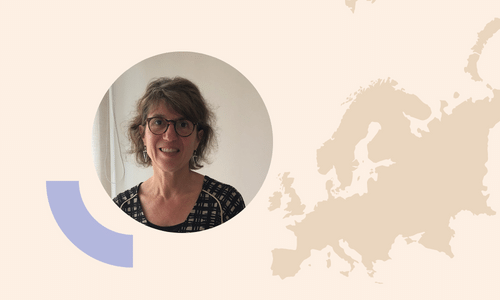
In this episode, we talk with cof-ounder of Com’access Karine Bardary about Easy Language in France.
capito is Italian and means “I get it.”
In the future, everyone should be able to say: “I have understood”.
+ 43 316 393 449 office@capito.eu
Headquarters
Heinrichstraße 145
8010 Graz
Austria
U.S. division
1247 Wisconsin Avenue NW Suite 201
Washington, DC 20007
USA
capito is part of the atempo group